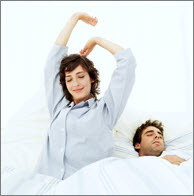In our busy everyday lives, most of us are much better at preparing for our day than preparing for bedtime. Here are 6 tips to put on your to-do list for transitioning to bedtime:
 If it has an On/Off switch, choose “Off” 30 minutes before bedtime. This means rounding up the usual suspects – the TV, anything with an “I” (I phone; I Pod; I Pad) and any other device that falls in the technology category. It’s impossible to wind down with these things pulling us into their web.
If it has an On/Off switch, choose “Off” 30 minutes before bedtime. This means rounding up the usual suspects – the TV, anything with an “I” (I phone; I Pod; I Pad) and any other device that falls in the technology category. It’s impossible to wind down with these things pulling us into their web.- Set a comfortable room temperature for sleeping. This means negotiating with your spouse or partner (if you have one) to find a set point that’s somewhere between a meat locker and a sauna. Lots of wiggle room here.
- Pray, meditate, read soothing or even boring literature. Repetitive prayer (repeating the same prayer over and over) is a great sleep inducer because of its sameness; meditation CDs or exercises relax the mind; and reading something non-stimulative tires us cognitively.
- Take all medication one hour before bedtime. As we age, not only does the Sandman greet us with more folded arms, it’s also more challenging to retain fluids we’ve consumed around bedtime without often frequent trips to the bathroom. Restricting fluids after eating dinner is a pretty good idea for most of us; this is not the time to hydrate, thus the one-hour rule for medication.
- Tire the mind and tire the body. For worker bees, tiring the mind is sufficiently accomplished by exercising ourselves cognitively throughout the day via our work. Tiring the body, of course, requires a different type of exercise – something our bodies don’t adapt to naturally – thus engendering resistance to physical workouts. But this is the ONLY way to effectively tire the body, helping us STAY asleep. Think of it this way: Tiring the mind helps us get to sleep; tiring the body helps us stay asleep.
- Get your sleeping quarters as dark as possible. This aids in the secretion of melatonin – our body’s naturally occurring sleep hormone. Melatonin regulates the circadian rhythm sleep cycle and is triggered by darkness. A word to the wise: Melatonin secretion decreases with advancing age. If you’re north of 40 years old, your melatonin secretion is cut in half; if you’re north of 60 years old, secretion is all but nil. Consider then melatonin supplementation to replace the hormone. Recommended dosing is 1 – 3 mg. nightly.




